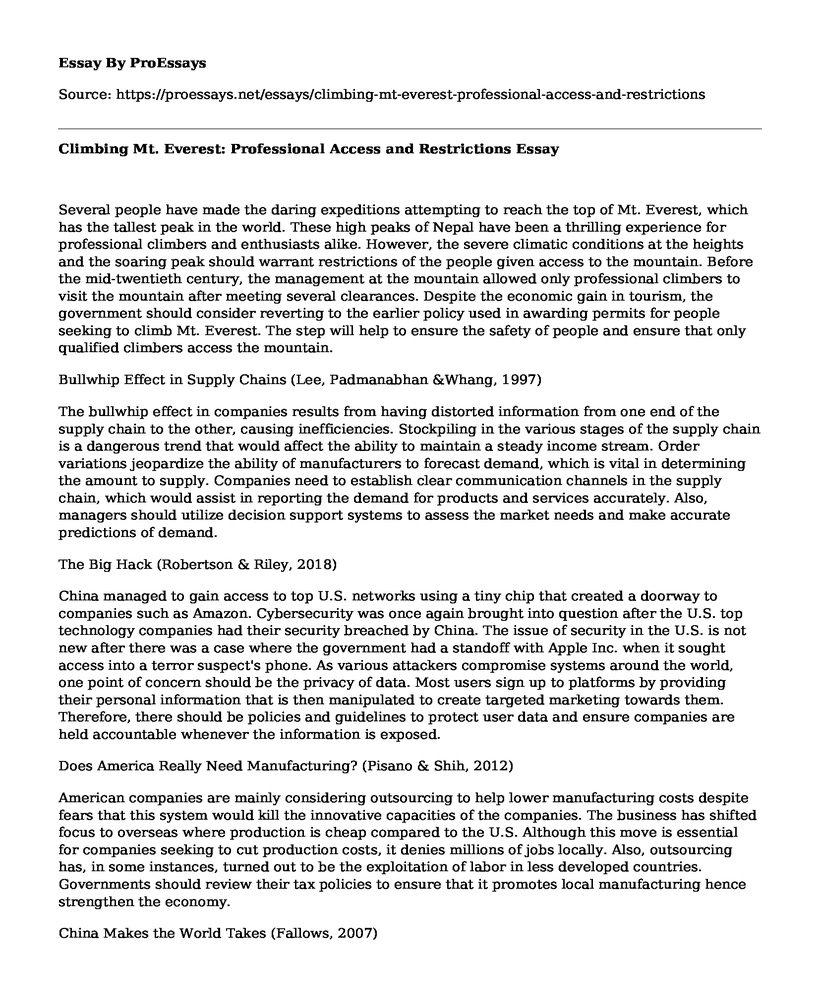Several people have made the daring expeditions attempting to reach the top of Mt. Everest, which has the tallest peak in the world. These high peaks of Nepal have been a thrilling experience for professional climbers and enthusiasts alike. However, the severe climatic conditions at the heights and the soaring peak should warrant restrictions of the people given access to the mountain. Before the mid-twentieth century, the management at the mountain allowed only professional climbers to visit the mountain after meeting several clearances. Despite the economic gain in tourism, the government should consider reverting to the earlier policy used in awarding permits for people seeking to climb Mt. Everest. The step will help to ensure the safety of people and ensure that only qualified climbers access the mountain.
Bullwhip Effect in Supply Chains (Lee, Padmanabhan &Whang, 1997)
The bullwhip effect in companies results from having distorted information from one end of the supply chain to the other, causing inefficiencies. Stockpiling in the various stages of the supply chain is a dangerous trend that would affect the ability to maintain a steady income stream. Order variations jeopardize the ability of manufacturers to forecast demand, which is vital in determining the amount to supply. Companies need to establish clear communication channels in the supply chain, which would assist in reporting the demand for products and services accurately. Also, managers should utilize decision support systems to assess the market needs and make accurate predictions of demand.
The Big Hack (Robertson & Riley, 2018)
China managed to gain access to top U.S. networks using a tiny chip that created a doorway to companies such as Amazon. Cybersecurity was once again brought into question after the U.S. top technology companies had their security breached by China. The issue of security in the U.S. is not new after there was a case where the government had a standoff with Apple Inc. when it sought access into a terror suspect's phone. As various attackers compromise systems around the world, one point of concern should be the privacy of data. Most users sign up to platforms by providing their personal information that is then manipulated to create targeted marketing towards them. Therefore, there should be policies and guidelines to protect user data and ensure companies are held accountable whenever the information is exposed.
Does America Really Need Manufacturing? (Pisano & Shih, 2012)
American companies are mainly considering outsourcing to help lower manufacturing costs despite fears that this system would kill the innovative capacities of the companies. The business has shifted focus to overseas where production is cheap compared to the U.S. Although this move is essential for companies seeking to cut production costs, it denies millions of jobs locally. Also, outsourcing has, in some instances, turned out to be the exploitation of labor in less developed countries. Governments should review their tax policies to ensure that it promotes local manufacturing hence strengthen the economy.
China Makes the World Takes (Fallows, 2007)
China has put its hundreds of millions of men and women behind the rigorous manufacturing industry producing goods for global consumption. The country is a hotbed for factories fuelled by its supply of skilled labor. The massive production occurring in China is perhaps part of the reason that the country is recently emerging as a potential superpower. Besides producing goods on a large scale, China has also gone a step further to export skilled labor to work in various infrastructural projects in different parts of the world. This global reach of the Chinese is estimated to keep rising because of its financial support to countries to help in funding projects.
References
Fallows, J. (2007). China Makes, the World Takes. The Atlantic, 48-72.
Lee, H. L., Padmanabhan, V., & Whang, S. (1997). The Bullwhip Effect in Supply Chains. Sloan Management Review, 38(3), 93-102.
Pisano, G. P., & Shih, W. C. (2012). Does America Really Need Manufacturing? Harvard Business Review, 94(3), 1-9.
Roberto, M. A., & Carioggia, G. M. (2003). Mount Everest - 1996. Harvard Business School, 1-22.Robertson, J. & Riley, M. (2018, Oct. 4). The Big Hack: How China Used a Tiny Chip to Infiltrate U.S. Companies. Bloomberg Businessweek. https://www.bloomberg.com/news/features/2018-10-04/the-big-hack-how-china-used-a-tiny-chip-to-infiltrate-america-s-top-companies?srnd=premium
Cite this page
Climbing Mt. Everest: Professional Access and Restrictions. (2023, May 15). Retrieved from https://proessays.net/essays/climbing-mt-everest-professional-access-and-restrictions
If you are the original author of this essay and no longer wish to have it published on the ProEssays website, please click below to request its removal:
- The Problem with Fat Talk by Renee Engeln - Article Analysis Essay
- The Relationship Between Group and Individual Identity - Essay Sample
- Research Paper on Effects of Aging and Mitral Valve Prolapse
- Essay Sample on Family Trauma Support: Healing for Victims of Abuse and Mental Health Issues
- Speech Example on The Incredible Life of Arnold Schwarzenegger
- Writing for Communication: Learning to Read & Write from an Early Age - Essay Sample
- LGBT Community Analysis - Free Paper Example







